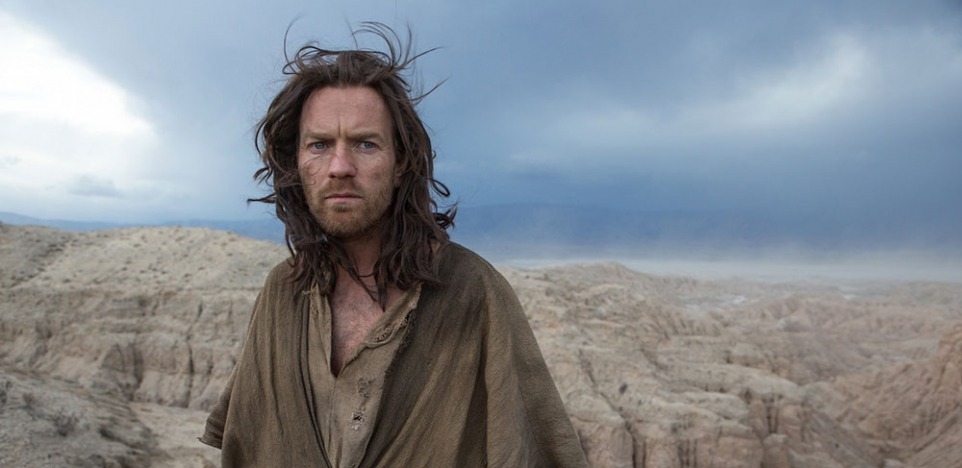"To receive the grace of God . . . you must go to a desert place and stay a while. There you can be emptied and unburdened of everything that does not pertain to God. There the house of our soul is swept clean to make room for God alone to dwell. . . . We need this silence, this absence of every creature, so that God can build his hermitage within us."
— Trappist monk Charles de Foucauld in Hidden in God by Bonnie Thurston
Yeshua (Ewan McGregor) has come to the desert for 40 days of solitude, silence, prayer, and fasting. Deserts are arid or dry regions that receive less than 10 inches of rain per year. They occupy almost one-quarter of the earth's land surface, which is approximately 20.9 million square miles. From ancient days to our own times, deserts have been challenges to the soul.
Yeshua's desert is a place of shifting sands, large rock outcrops, blindingly bright days, and dark nights. Movement in the heat is slowed to a crawl. There is no map to this barren place, and it is easy to lose your bearings and to wander in circles.
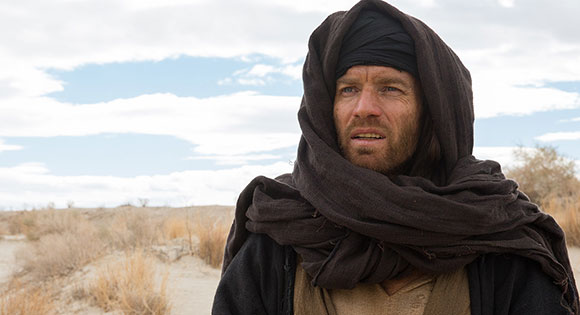
As Yeshua walks through rock passageways and open sandscapes, we see the crustiness of his lips, the fatigue in his legs, and the faraway look of a man who is in mystical trance. He has taken leave of ordinary life to forge a deeper bond with God the Father. We admire him for his patience and his use of the spiritual practices of solitude and silence to polish his character and forge a resilience that will serve him well when he returns to society.
Yeshua cries out, "Father speak to me," but there is no response. "Father, where are you?" he asks, but he hears only the wind. Frustrated by this feeling of being abandoned by God, he stumbles upon a beggar woman lying in a sheltered area. He kindly gives her some water to drink but her only response is a hysterical laugh.
He is clearly in a vulnerable state due to exposure to the hot sun and the dizziness and exhaustion that come from his fasting. Vigilance is required in this harsh wilderness. Yeshua succumbs to paranoia and becomes convinced that someone is following him.
And he is right. A Demon who is his exact double (Ewan McGregor) has arrived in the desert to taunt this holy man. He claims that the Father is self-centered, distant, deaf, and mute. He also states that God has many other children and does not see Yeshua as someone special.
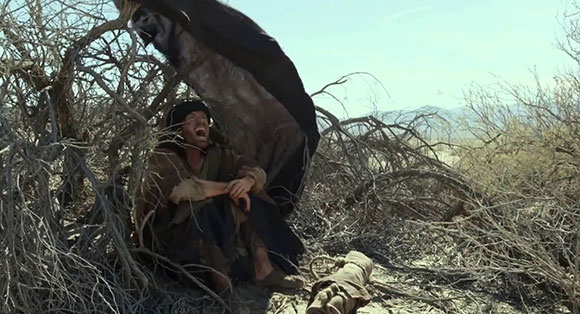
In the face of this rapacious attack, the holy man retreats to rest. A curious insect crawls up his hand and then his face. Yeshua does not brush it away. Here we see a gentle human being who is open to the world around him even when he is experiencing disappointment. Trying to avoid the wind, he sits down to sleep and wakes with thorns tangled in his hair. He laughs at this ridiculous little predicament and moves on.
Yeshua happens upon a stone cutter (Ciaran Hinds) who is constructing a house on a cliff with an expansive view of the rock formations, the desert, and in the distance the shining jewel of Jerusalem. It does not take Yeshua very long to see that this hospitable man is staggering under the sadness of a much younger wife (Ayelet Zurer) who is dying and a teenage son (Tye Sheridan) who desperately yearns to leave home and start a new life on his own in Jerusalem.
Out of compassion for the stone cutter, Yeshua volunteers to use his carpentry skills to help in the slow construction of the house. The Demon appears again and proposes a wager. Can Yeshua "untangle the knot" by setting right each of the three family members?
It is very gratifying to watch Yeshua connect emotionally with the boy who tells him a riddle and then asks what Jerusalem is like. He replies, "Dirty and corrupt. But also alive, very alive." When the father reveals his regret that his words to his son often come out too harsh, Yeshua advises that he talk with the boy about what he is interested in.
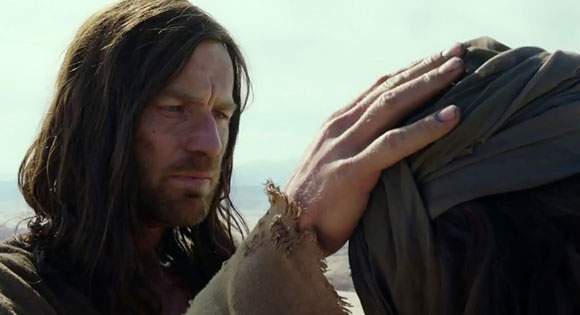
Over the days he is with them, Yeshua's heart goes out to all the members of the family. He tries to help the father with a project to provide for the family. He blesses the boy, who is given one last chance to prove that he is not a bad son. He bestows his loving touch upon the mother, who just wants to be left alone to die. Yeshua shows great empathy for each member of this isolated family, but he knows he cannot be the answer to all their problems.
The Creative Team Behind Last Days in the Desert
Writer and director Rodrigo Garcia is the son of Gabriel Garcia Marquez, the Nobel Prize-winning author of One Hundred Years of Solitude and Love in the Time of Cholera. He made an excellent choice casting Ewan McGregor who puts in sensitive and emotionally literate performances as both the tender and caring Yeshua and the taunting Demon. Ciaran Hinds touches our hearts with his vulnerable and inspiring depiction of a father who wants to reach out to his son, and Tye Sheridan is right in synch with the wild dreams and energetic yearnings of youth.
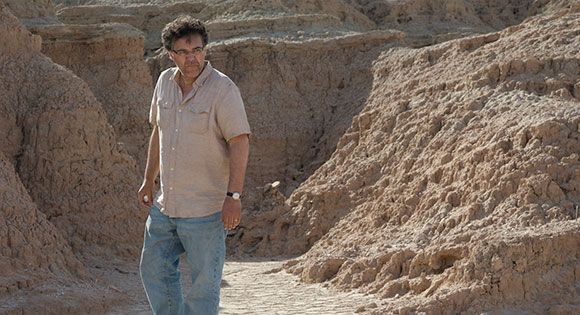
The desert itself is a major character in the film and we give three cheers for the varied and mesmerizing cinematography of Emmanuel Lubezki shot on locations in the Anza-Borrego Desert State Park east of San Diego, California. The musical score by Saunder Jurriaans and Danny Bensi is meditative and unobtrusive, lending a serene background to the drama.
The Film's Many Messages
Last Days in the Desert is an immersive spiritual drama about the questing of a holy man to connect with God and be affirmed in his mission. It was inspired by the biblical story of Jesus' 40 days in the wilderness during which he was tempted by the Devil (Matthew 4: 1 – 11). Director Garcia has re-imagined that situation, updating the temptations to contemporary ones: the need to be special, the urge to fix people's problems, fear of what might happen in the future. It is also about fathers and sons, family loyalty and love, presence, empathy, compassion, the shadow, and the mystery that abounds in the Divine grace that infuses all of life with meaning.
Of all the many movies made about Jesus, Last Days in the Desert is closest to Pier Paolo Pasolini's austere The Gospel According to Saint Matthew. Spare and open-ended, we believe this version of the story will appeal to Christians and also to those who identify themselves as Spiritual Independents. The latter are often drawn to a spirituality that emphasizes:
- the search for meaning and purpose
- the importance of relationships
- the recognition that faith and doubt are members of the same family
- walking with empathy in another's shoes
- questing as an antidote to dogmatic certitude
- paradox as the nature of reality
- listening in silence and solitude
- gratitude as a state of mind and a way of life
- shadow work as an important part of the curriculum for spiritual maturity
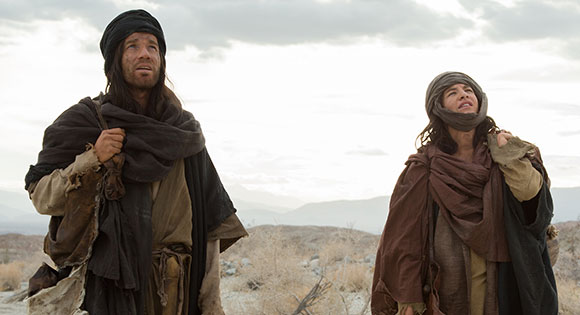
The Structure of this Guide to Last Days in the Desert
In an early scene in this drama, Yeshua asks the Father to speak to him but there is no response. "Father, where are you?" is the question that many of us ask throughout our lives. In the biblical accounts of his baptism, Yeshua was blessed by God; has his Father now abandoned him? Where is God and how is he speaking? Those are the deep universal questions of this film. In order to ponder them, we have structured this Guide into sections on:
1. God Is Speaking through the World
2. God Is Speaking through Yeshua
3. God Is Speaking through the Family
4. God Is Speaking through the Demon
In each module, we have identified aspects of this theme evident in the film and also provided thought-piece quotations to broaden your reflections. We encourage you to watch or remember the film with these ideas in mind and see what spiritual lessons you can take from them.
1. God Is Speaking through the World
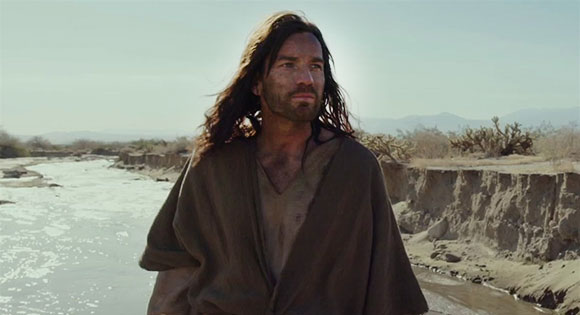
The Desert
The desert is a formidable place. It puts human life to the test and becomes a workshop for the spirit for those who dare enter it.
"The laws of the desert are rigid. Be transformed, or endure your imperfection forever. Jesus too knew the desert. Born to it though not of it, he tasted its scant joys and suffered its binding question. . . . He communed with the desert elements when they acceded to a divine spark and when they grew cold again in night frost."
— David Applebaum in Everyday Spirits
Water
As Yeshua wanders, we see how important it is for him and later for the family to have enough water. We cannot afford to take water for granted; it must be cherished and protected and available to all.
"Pure, clean, sparkling water. Surely water is one of our healthiest drinks. It's easy to forget, in our thirst, as we gulp down this precious gift that some people don't have pure water. Some water has to be boiled in order to be safe for drinking. Some people have to walk great distances to get the water they need. As we allow ourselves to remember this, it can make us more grateful."
— Macrina Wiederkehr in Gold in Your Memories
Silence
In stillness, you can dive deep within yourself and experience union with the Divine.
"Within each of us there is
a silence as vast as the universe.
We long for it.
We can return to it."
— Jack Kornfield in The Art of Forgiveness, Lovingkindness, and Peace
Solitude
We all need a place apart from family, friends, and communities where we can uncover the truth of who we are. It is that need that sends Yeshua into the desert, and the desert does not disappoint.
"Solitude is a discipline in which you deal with your loneliness in such a way that it doesn't destroy you or others; instead it becomes a place to discover the truth of who you are. You are created by a God who wants all your attention and who wants to give you all the love you need."
— Henri J. M. Nouwen in Beloved
Insects and Other Beings
We are not alone on the Earth. Being accepting of other beings is a holy act; so it taking time to commune with them. In a wonderful scene, Yeshua reveals his gentleness to an insect he allows to travel from his hand to his face. Perhaps this curious creature has some wisdom of survival to pass on to him. Desert creatures survive only through ingenious adaptation to austerity.
"We are missing fully half of nature when we eliminate insects from our world of interest. Considering the beauty of color and form and song added to our world and the increase in intelligence offered to us, it is utterly objectionable to impose our antagonism on the insect components of the Great Community of the Earth. Each of these tiny insects is, by definition, an animated being, a being with an anima, a soul; not a human soul indeed, but an insect soul, a thing of marvelous beauty expressing some aspect of the divine."
— Joanne Elizabeth Lauck in The Voice of the Infinite in the Small
Dead Animal
Near a stream, Yeshua and the boy come upon the hollowed out corpse of an animal; with its vital essence sucked out of it, it appears to be only whitened bones in the sand. Life is repeatedly tested and death is always near in this arid place. Animals can be carriers of spiritual messages even when life has gone out of them.
"The tiniest and most forgotten creature is fresh and alive in God's memory."
— Bartholome de Las Casas in Political Holiness
2. God Is Speaking through Yeshua
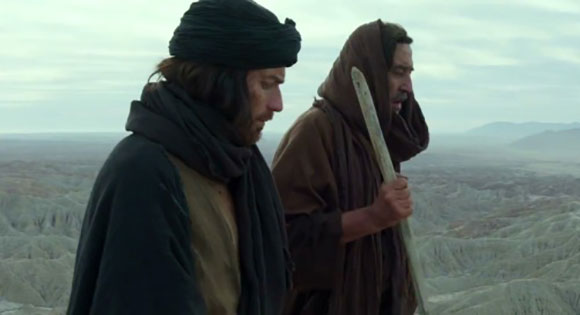
Caring and Nurturing
Yeshua seeks to embody God's care and graciousness in his encounters with the desert family. He demonstrates love and perhaps most important, respect, for what they each want to do with their lives.
"Yeshua's estimate of human personality, its divine origin, spiritual nature, supreme worth, boundless possibility, and eternal destiny represents his most original contribution to human thought."
— Dale Turner in Grateful Living
Fasting
Yeshua has come to the desert to fast and pray, to seek guidance, and to prepare for his mission. Fasting is a spiritual practice that both restrains and restores.
"Fasting as a religious act increases our sensitivity to the mystery always and everywhere present to us. It is a passageway into the world of spirit to explore its territory and bring back a wisdom necessary for living a fulfilled life. It is an invitation to awareness, a call to compassion for the needy, a cry of distress, and a song of joy. It is a discipline of self-restraint, a ritual of purification, and a sanctuary for the spiritually lost, and inner nourishment for the spiritually hungry."
— Thomas Ryan in The Sacred Art of Fasting
Listening
Yeshua's chief gift to the family is his listening heart. They share with him feelings that they may not have admitted to each other. Listening is an essential spiritual practice that deepens our connections with others.
"Listening is a magnetic and strange thing — a creative force. The friends who listen to us are the ones we move toward, and we want to sit in their radius. When we are listened to, it creates us, makes us unfold and expand."
— Dr. Karl Menninger in Love Against Hate
Empathy
As Yeshua walks for a while in the shoes of the family members, he not only learns who they are, he also gets insights into his own desires. Empathy breaks down the walls that separate us from others.
"Empathy allows us to see the connections between us, making strangers less strange, foreigners less foreign. When we adopt other people's perspectives, we do more than step into their shoes -- we use their eyes, we borrow their skin, we feel their hearts beating within us, we lose ourselves and enter their world, as if we were them."
— Arthur P. Ciaramicoli and Katherine Ketcham in The Power of Empathy
Compassion
The mother is dying, and her husband and son know it. Yeshua realizes the only thing that he can do is demonstrate compassion toward all of them.
"Compassion for me is just what the word says; it is 'suffering with.' It is an immediate participation in the suffering of another to such a degree that your forget yourself and your own safety and spontaneously do what is necessary."
— Joseph Campbell in Spiritual Literacy
Kindness
In the desert, while he is being present, Yeshua also helps by doing. He lends his strength and the skills to the building of the family's home; he helps the boy carry water across a long distance.
"I shall pass through this world but once. Any good I can do or any kindness that I can show to any human being, let me do it now. Let me not defer or neglect it, for I shall not pass this way again."
— Stephen Greliet
Blessing
Yeshua's final gifts to the family are blessings. A blessing conveys primal energy and brings healing and hope.
"We 'live and breathe and have our being' by sharing in God's life. Ultimately life is the primal energy that fuels the universe. That aliveness flows into us as blessing and wants to flow out from us as blessing to others. We can bless others with a good word or a smile, a kind of action that goes completely unobserved, or simply a good wish in silence. What joy to become aware of blessing, of that special aliveness flowing into us and through us."
— David Steindl-Rast in Music of Silence
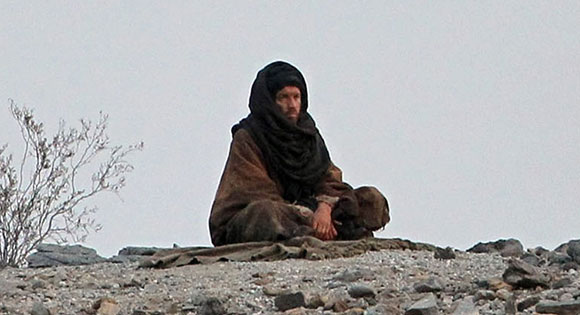
Patience
There are moments in the film when we sense that Yeshua is ready to move on, to go to Jerusalem and begin his public ministry. Yet he stays on in the desert. He is demonstrating that patience is a divine virtue that must be practiced in the midst of turmoil and troubles. We wait for the right time.
"Patience is a divine virtue. Unfortunately, not only are we badly wanting in this divine virtue, but also we neglect it most foolishly. What is patience? It is an inner assurance of God's unreserved love and unconditional guidance. Patience is God's power hidden in us to weather the teeming storms of life."
— Sri Chinmoy in The Wisdom of Sri Chinmoy
Emotional Intelligence
Jesus has not begun his public ministry when he is in the desert. But he is already teaching others, including the Demon. He is facing and dealing with a wide variety of emotions.
"As a human being, Jesus had emotions. Emotional intelligence has to do with how we manage our emotions so as to function effectively in relationships. The portrait of Jesus is remarkably consistent: Jesus affirms, displays, and promotes positive emotions such as compassion, and he avoids and warns against negative emotions such as hatred, greed, envy, and fear."
— Roy M. Oswald and Arland Jacobson in The Emotional Intelligence of Jesus
Discerning God's Desire
Desert sojourns are often about discernment. When Yeshua calls out, "Father, speak to me," he is seeking guidance. His call is also our call. We ask ourselves, "What good thing shall I do?"
"A brother asked one of the elders: What good thing shall I do, and have life thereby? The old man replied: God alone knows what is good. However, I have heard it said that someone inquired of Father Abbot Nisteros the great, the friend of Abbot Anthony, asking: What good work shall I do? and that he replied: Not all works are alike. For Scripture says that Abraham was hospitable and God was with him. Elias loved solitary prayer, and God was with him. And David was humble, and God was with him. Therefore, whatever you see your soul to desire according to God, do that thing, and you shall keep your heart safe."
— Thomas Merton in The Wisdom of the Desert
3. God Is Speaking through the Family
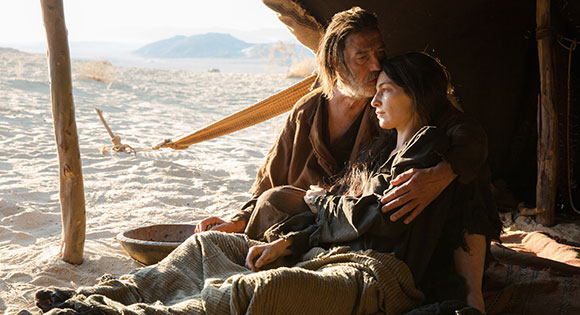
Yearning of Youth
The boy yearns to start his own life in a different place. He reminds us that desire is a force that can take us beyond ourselves.
"We yearn for the parts that have been underdeveloped to grow, and those that were overdeveloped to be pruned. We yearn for the parts that have been silent to speak, and those that were noisy to be still. We yearn for the parts that have been alone to find companionship, and those that have been over-crowded to find solitude. We yearn to live our unlived lives."
— Mark Gerzon in Listening to Midlife
Regrets
The father is filled with regrets, especially about his relationship with the boy. Yeshua tries to help him reframe them.
"If we are consumed by regrets, we overlook all the good that has come from our decisions and actions. So when you find yourself having regrets, bring to mind times when you did the right thing and came out happy and fulfilled. Investigate how these positive memories are different from the memories that are filled with regret. Adjust your attitudes so that you are acting in ways consistent with your positive memories."
— Frederic and Mary Ann Brussat in "Reframing Regrets"
Hospitality
Although he is a stranger, the family welcomes Yeshua, gives him food and drink and place to sleep. Desert hospitality is well known in the Middle East. It is an attitude and a practice people everywhere would do well to emulate.
"When we make choices to become more hospitable, we find that we become more whole ourselves — open to the world, to life, to relationship. Living centered in hospitality is living centered in love, trust, possibility, and hope. When we allow God and true self to come together in our inner core, we find ourselves filled with a love that we can't help but share."
— Nanette Sawyer in Hospitality — The Sacred Art
The Presence of Death
Death is near throughout this story; It is almost another character. We find ourselves asking, what would it be like to die or to have a loved one die? And what is a good death?
"We who know so little of the mysteries of life cannot be expected to have all the answers relating to death, but by being there with physical presence, a phone call or a letter, by listening and offering what help we can, we may soften grief for another and share in the healing process."
— Dale Turner in Grateful Living
Legacy
Every character in the film is in the process of creating his legacy. What is the father's? the mother's? the boy's? Too often we don't reflect upon the positive impact of what we do. This film reminds us to begin where we are.
"Service has a life of its own. A single act of kindness may have a long trajectory and touch those we will never meet or see. Something that we causally offer may move through a web of connection far beyond ourselves to have effects that we may have never imagined. And so each of us may have left far more behind us than we may ever know."
— Rachel Naomi Remen in My Grandfather's Blessing
4. God Is Speaking through the Demon
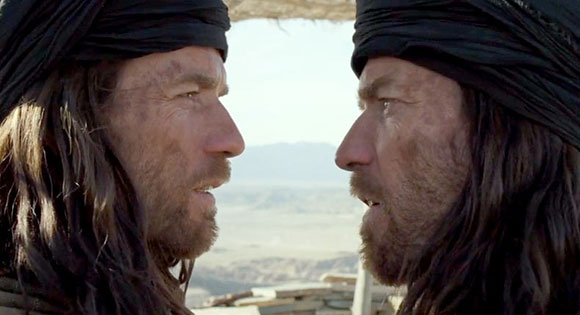
The Temptations
In the Gospels of Matthew and Luke, Satan tempts Jesus three times, and the holy man faces and surmounts them. In so doing, remains true to his calling and his selfless mission to serve others. In the film, Jesus is also tempted, but in different ways. The viewer is also challenged by the Demon. How would you respond to his taunts? Could you walk side-by-side with him?
"By placing the temptation story as the prelude to Jesus' ministry, the Gospels are saying that this confrontation with one's demons is the paradigmatic experience necessary for true discipleship. It is certainly no accident that Jesus is said to have withdrawn by himself to quiet places to pray — a kind of return to the desert as an example for his followers."
— Roy M. Oswald and Arland Jacobson in The Emotional Intelligence of Jesus
Who Are You?
Yeshua and the Demon are played by the same actor in the film, suggesting that we understand the Demon in a contemporary way -- as the shadow side of Yeshua, articulating those feelings and behaviors that he would prefer to keep hidden even from himself. But in the desert, the shadow is exposed to the light and he is challenged to assert who he really is. We leave the movie knowing we must do the same.
"Jews were familiar with the belief that evil spirits of a minor character sometimes appeared to human beings and sought to mislead them, or even gained access to them, assuming control of their personalities and deranging their mind, either temporarily or permanently. But there is no example in Jewish literature before the time of Jesus in which Satan appears to a man face to face and engages him in conversation."
— Vernon S. McCasland in The Pioneer of Our Faith
"Embrace the wilderness; hold to your bosom the desert experiences of your life. Keep them close to you. Learn from them."
— Kenneth Hanson in Words of Light: Spiritual Wisdom from the Dead Sea Scrolls
